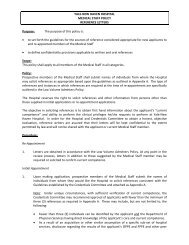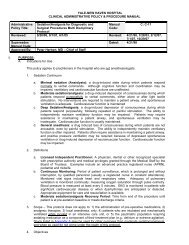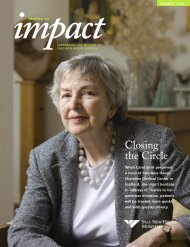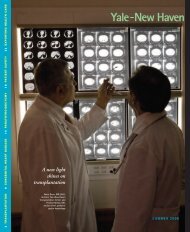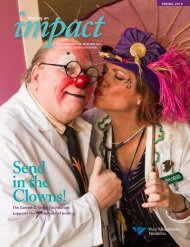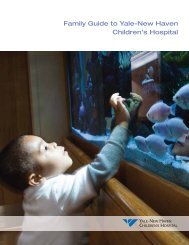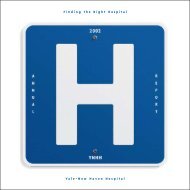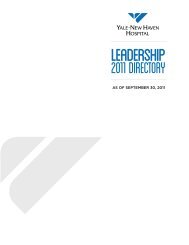Nursing Update 2007 - 2008 - Yale-New Haven Hospital
Nursing Update 2007 - 2008 - Yale-New Haven Hospital
Nursing Update 2007 - 2008 - Yale-New Haven Hospital
You also want an ePaper? Increase the reach of your titles
YUMPU automatically turns print PDFs into web optimized ePapers that Google loves.
School-based nurses<br />
keep teens in the care loop<br />
Adolescents aren’t likely to go to the doctor<br />
on their own, and even parents who have<br />
insurance may be too busy to get them there.<br />
As a result, advanced practice nurses at seven<br />
YNHH school-based health centers (SBHC) in<br />
the greater <strong>New</strong> <strong>Haven</strong> area provide on-site<br />
services, including primary health assessments<br />
as well as diagnosis and treatment of major and<br />
minor illnesses.<br />
In <strong>2007</strong>, the YNHH SBHCs treated nearly 9,000<br />
students in elementary, middle and high schools<br />
in Branford, Hamden and <strong>New</strong> <strong>Haven</strong>. Nurses<br />
may treat or advise students on diabetes, obesity,<br />
pregnancy and sexually transmitted diseases.<br />
Lynn Peckham, advanced practice registered<br />
nurse in <strong>New</strong> <strong>Haven</strong>’s Sheridan Middle School,<br />
said the most prevalent problem she sees among<br />
students is asthma. She explains that schoolbased<br />
nurses make an impact in helping students<br />
manage asthma so they can stay in school and<br />
out of the hospital. In addition, YNHH social<br />
workers work on-site at the SBHCs and help<br />
students with anger management, anxiety,<br />
depression and phobias.<br />
In addition to providing an important link<br />
between students and additional community<br />
services, school-based nurses establish YNHH as<br />
a medical home for those who don’t have one.<br />
They also provide health education that gives<br />
students a firm understanding of the importance<br />
of taking responsibility for their own<br />
health.<br />
Nurses help detect cancer<br />
early in the community<br />
If success means convincing women to take<br />
responsibility for their health, the Connecticut<br />
Breast and Cervical Cancer Early Detection<br />
Program for medically underserved women is<br />
making its mark. Working out of the YNHH<br />
Department of Community Health, the staff has<br />
always had to make multiple calls to get some<br />
patients in for screenings, but lately more women<br />
have been seeking out the program and making<br />
appointments themselves.<br />
Christine Galla, R.N., case manager, gives credit to<br />
media marketing efforts and vigorous outreach.<br />
YNHH, one of 18 sites in the state to offer cancer<br />
screening through this program, sends outreach<br />
workers to churches, hair salons and housing<br />
projects to educate women. The program provides<br />
Pap smears to women 19 to 64 years of age<br />
who have no insurance coverage or prohibitive<br />
deductibles, and mammograms to medically<br />
underserved women who are 40 and older.<br />
The program especially hopes to reach older<br />
women, who are likely to avoid mammograms;<br />
and African-American and Hispanic women,<br />
who have the highest mortality rate among all<br />
racial and ethnic groups.<br />
In the grant’s fiscal year that ended in June <strong>2007</strong>,<br />
the Early Detection Program made outreach visits<br />
to 902 women at 20 locations in the greater <strong>New</strong><br />
<strong>Haven</strong> area, and provided services to 251 women.<br />
Last July, YNHH launched a digital mammography<br />
van, the first in Connecticut, to provide mammograms<br />
to women where they live and work.<br />
Stroke team takes the<br />
offensive against brain attacks<br />
Since YNHH revamped its stroke program,<br />
nurses have played a key role in helping the<br />
hospital earn the distinction as a Joint Commission<br />
Primary Stroke Center, providing acute<br />
and recovery care for the more than 600 stroke<br />
patients the hospital admits each year.<br />
Karin Nyström, A.P.R.N., clinical coordinator,<br />
said the stroke program and neuroscience units<br />
at YNHH offer rich opportunities for nurses interested<br />
in research or clinical nursing. They can<br />
participate on multidisciplinary teams specially<br />
trained to evaluate and treat stroke and other<br />
cerebrovascular diseases. Nurses also collaborate<br />
with the YNHH Emergency Department to<br />
enhance the effective use of the clot-dissolving<br />
agent tPA.<br />
YNHH was the first hospital in southern Connecticut<br />
and the fourth in <strong>New</strong> England to<br />
become nationally certified as a Primary Stroke<br />
Center by The Joint Commission.<br />
In addition, YNHH nurses are actively involved<br />
with the program’s Stamp Out Stroke (S.O.S.)<br />
team, which educates people in the community<br />
to recognize symptoms of stroke and get to the<br />
hospital by calling 9-1-1 within the three-hour<br />
window when treatment is most successful.<br />
While the program has yet to measure the clinical<br />
outcomes of these efforts, Nystrom believes<br />
outreach, close teamwork and cutting-edge<br />
treatments are making a powerful impact in the<br />
diagnosis and treatment of stroke.<br />
Every woman in <strong>New</strong> <strong>Haven</strong> should make appointments for<br />
annual mammograms and cervical screenings. Unfortunately,<br />
needy women have incredibly difficult lives – they have to get<br />
past economic and transportation barriers, not to mention the<br />
fear barrier. At YNHH, we are reaching these women and letting<br />
them know we can help. Their health is important to us.”<br />
— Christine Galla, R.N., Case Manager, Connecticut Breast and Cervical Cancer<br />
Early Detection Program<br />
Y A L E - N E W H A V E N H O S P I T A L 1 1



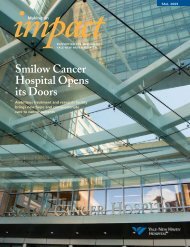
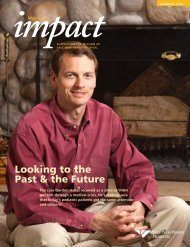
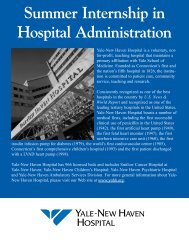
![Annual Report Donor Listings [pdf] - Yale-New Haven Hospital](https://img.yumpu.com/49673575/1/190x245/annual-report-donor-listings-pdf-yale-new-haven-hospital.jpg?quality=85)

